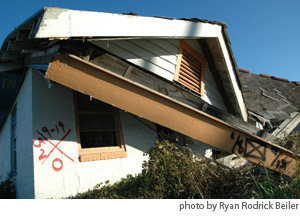The International Monetary Fund, whose board will meet this weekend in Washington, D.C., continues to use its role as a gatekeeper for rich country aid to impose questionable, and often downright harmful, conditions onto poor countries. For example, the IMF has often imposed “wage bill ceilings” that limit how much money a government can spend on salaries – sometimes even when that money comes from foreign aid offered to help fight poverty or the AIDS epidemic – because the IMF is concerned that paying too many salaries could cause inflation to rise a few percent. As South African economist Francis Ng’ambi points out, IMF “conditionality” threatens to counteract some of the benefits won by Jubilee debt campaigners. Sojourners spoke with him in March at Ecumenical Advocacy Days.
Ng’ambi: Malawi just got its debt cancellation a few months ago, late last year. And people now are happy, but the biggest thing they are asking themselves is, “How do we make the maximum benefit out of the debt cancellation?” Already the money that has been freed is going to promote access to education by children, students. They are going to hire doctors, they are going to hire nurses – if that will be allowed by the conditionalities set by the IMF.
Because the IMF says, for example, do not employ new personnel, do not increase the [government’s] wage bill. Now the people in Malawi – that is, government, civil society, donors, and especially the churches – have to come in to support the government on how make sure that this money is budgeted properly.
Sojourners: So there is an ongoing threat that the IMF program officer to Malawi might say “no, your budget is too large”?
Ng’ambi: Yes, because these things were signed in what they call the “letter of intent.” It was signed there [recently]. After 1980, when you have been going through the conditionalities, people have seen on the ground that conditionalities have not been good. They have always brought negative impact. So that means now with the money freed [by debt cancellation], the civil society, the government, have to approach the IMF, and discuss with them to say, how can we now use this money to inject into education, health, and agriculture? They must enter some form of dialogue, looking at the conditionalities set, because we need nurses, we need medical doctors.
I think many of our readers will be shocked that there even has to be a dialogue with the IMF – that although a country has the money and wants to spend it on teachers, you have to argue the IMF into letting you hire them.
Yes, that’s the fact in southern Africa, most of the national budgets in southern Africa have to have some form of approval of the IMF. And even sometimes it’s even prior to the parliament discussing that particular budget. Why? Because they have to look at some of the macro conditionalities.
You know, it’s a big problem. It dehumanizes, it actually leaves the government powerless, because they cannot make decisions in the way they want. They always have to go back to the drawing table. A budget is supposed to be an internal issue, not necessarily involving other people outside. But because of the conditionalities, the macro-policies … development in our countries has been left in the hands of the IMF and the World Bank. And that is not right in any way.
What gives you hope for the future?
There’s a lot of hope. First of all, what gives us hope is that we are not fighting on our own, southern countries only. We have got like-minded people in the north who are thinking like us. And that is a very powerful tool to use, because you are in a better position whereby you can lobby governments in the north.
Secondly, we are hopeful because the world is becoming smaller and smaller. Problems in the south are being heard in the north. Civil society in the south is being linked to civil society in the north. We can exchange views, we can exchange ideas, we can even share strategy on how to actually solve something. Another thing is that we are now one big Christian community. We pray together.
The body of Christ.
The body of Christ. In the south we are praying, in the north we are praying. So all over, we are praying over the same issue, and that gives us hope.

Francis Ng’ambi is Budget Monitoring Officer at the Economic Justice Network of the Fellowship of Christian Councils in Southern Africa.

